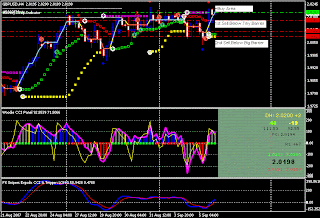By Anchalee Worrachate
Sept. 8 (Bloomberg) -- The pound fell against the euro this week on speculation U.K. interest rates have peaked while the European Central Bank will increase them further this year, eroding the British currency's yield advantage.
The Bank of England and the ECB kept their benchmark rates on hold on Sept. 6 as they assess the effect on their economies of losses linked to U.S. subprime mortgages. While the BOE said inflation ``may remain around, or little below'' its target, the ECB noted price risks ``lie on the upside.''
``We believe the U.K. bank rate has now reached its peak,'' said Richard Dingwall-Smith, chief economist at Scottish Widows Investment Partnership in Edinburgh. ``The risk the bank may push rates to 6 percent or beyond has receded in light of the ongoing global turmoil in financial markets.''
The U.K. central bank raised its benchmark rate to a six- year high of 5.75 percent in July and the ECB increased its rate to 4 percent in June.
The pound traded at 67.79 pence per euro late yesterday in London, from 67.65 pence on Sept. 5.
The U.K. currency also fell against the yen as Asian stock declines and concern over the credit-market crisis prompted investors to cut higher-risk currency holdings funded by loans in Japan.
The pound was at 231.30 yen late yesterday, compared with 233.51 on Sept. 6. The U.K. currency had its biggest decline in three months against the yen in August as concern over the financial-market rout forced investors to reverse so-called carry trades.
The Nikkei 225 Average fell 0.9 percent yesterday and 2.7 percent this week. The Morgan Stanley Capital International Asia- Pacific Index of regional shares declined 0.3 percent.
U.S. Payrolls
The pound rose to the highest in a month against the dollar after a government report showed the U.S. economy unexpectedly lost jobs last month for the first time in four years.
The U.S. non-farm payrolls data fueled concern the credit- market turmoil is spilling over into the broader economy.
The pound traded at $2.0295, from $2.0237 on Sept. 6. The currency has gained for three weeks against the dollar.
The three-month rate banks charge each other for pounds rose to the highest since 1998, suggesting lenders are still reluctant to offer cash to the money market for fear losses linked to U.S. subprime mortgages will hurt their counter-parties' ability to pay back loans.
``Unless we see a clearer picture of what actually is happening with the subprime sector, the problem in the credit market will persist,'' said Marios Maratheftis, a currency strategist at Standard Chartered Bank in London. ``In this environment, people are reluctant to put strong bets on high yielders, including the pound.''
Gilts Gain
In carry trades, investors get funds in a country with low borrowing costs and invest in one with higher interest rates, earning the spread between the borrowing and lending rate. The risk is that currency market moves erase those profits.
U.K. government bonds had a second weekly gain as investors bet the distress in financial markets will hurt the economy. Yields on 10-year gilts fell to 4.97 percent, from 5.04 percent at the end of last week.
The price of the 4 percent bond maturing in September 2016 rose 0.57 from last week or 5.7 pounds per 1,000-pound face amount ($2,095) to 93.13.
Economists in a Bloomberg News survey expect the 10-year yield to rise to 5.32 percent by the end of this year.
The yield on the December interest-rate futures contract fell 11 basis points to 6.34 percent yesterday. The contract settles to the three-month London interbank offered rate for the pound, which has averaged about 15 basis points more than the BOE's key rate for the past decade.
To contact the reporter on this story: Anchalee Worrachate in London at aworrachate@bloomberg.net
 In 4 hr chart, GU is still uptrend but GU is near the resistance 2.0461. If GU breaks the resistance 2.0461, GU will be 2.0537, 2.0627.
In 4 hr chart, GU is still uptrend but GU is near the resistance 2.0461. If GU breaks the resistance 2.0461, GU will be 2.0537, 2.0627.











